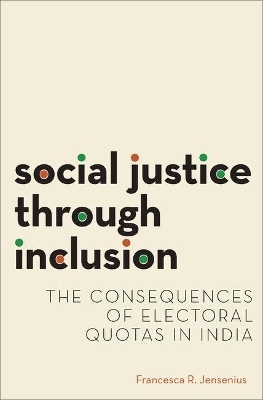
Social Justice through Inclusion
Oxford University Press Inc (Verlag)
978-0-19-064660-8 (ISBN)
Across the world, governments design and implement policies with the explicit goal of promoting social justice. But can such institutions change entrenched social norms? And what effects should we expect from differently designed policies? Francesca R. Jensenius' Social Justice through Inclusion is an empirically rich study of one of the most extensive electoral quota systems in the world: the reserved seats for the Scheduled Castes (SCs, the former "untouchables") in India's legislative assemblies. Combining evidence from quantitative datasets from the period 1969-2012, archival work, and in-depth interviews with politicians, civil servants, and voters across India, the book explores the long-term effects of electoral quotas for the political elite and the general population. It shows that the quota system has played an important role in reducing caste-based discrimination, particularly at the elite level. Interestingly, this is not because the system has led to more group representation - SC politicians working specifically for SC interests - but because it has made possible the creation and empowerment of a new SC elite who have gradually become integrated into mainstream politics. This is a study of India, but the findings and discussions have broader implications. Policies such as quotas are usually supported with arguments about various assumed positive long-term consequences. The nuanced discussions in this book shed light on how electoral quotas for SCs have shaped the incentives for politicians, parties, and voters, and indicate the trade-offs inherent in how such policies of group inclusion are designed.
Francesca R. Jensenius is a Senior Research Fellow at the Norwegian Institute of International Affairs (NUPI). She specializes in comparative politics and comparative political economy, with a focus on India. Her main research interest is how institutional design and organizational structures affect different types of inequality in society. She is the author of a number of articles on elections, political representation and development in India.
Acknowledgments
A note on terminology
1. The Effects of Political Inclusion
2. From Representation to Integration
3. Whose Representative?
4. Quotas and Development
5. A New Political Elite
6. Quotas and Political Participation
7. Status and Recognition
8. Chipping Away at the Caste Hierarchy
9. Trade-offs in Institutional Design
Appendices
| Erscheinungsdatum | 12.08.2017 |
|---|---|
| Reihe/Serie | Modern South Asia |
| Verlagsort | New York |
| Sprache | englisch |
| Maße | 239 x 160 mm |
| Gewicht | 488 g |
| Themenwelt | Recht / Steuern ► EU / Internationales Recht |
| Sozialwissenschaften ► Ethnologie | |
| Sozialwissenschaften ► Politik / Verwaltung ► Politische Systeme | |
| Sozialwissenschaften ► Politik / Verwaltung ► Staat / Verwaltung | |
| Sozialwissenschaften ► Politik / Verwaltung ► Vergleichende Politikwissenschaften | |
| Sozialwissenschaften ► Soziologie ► Spezielle Soziologien | |
| ISBN-10 | 0-19-064660-8 / 0190646608 |
| ISBN-13 | 978-0-19-064660-8 / 9780190646608 |
| Zustand | Neuware |
| Haben Sie eine Frage zum Produkt? |
aus dem Bereich


